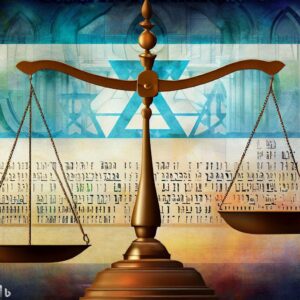
The relationship between Israel’s political and justice systems has always been complex, with both institutions playing crucial roles in the country’s governance. However, recent events have highlighted the growing tension between these systems, raising concerns about the delicate balance of power. This article will explore the roots of this tension, discuss the key players and events, and analyze the implications for Israel’s democratic future.
Historical Perspective – A Foundation of Checks and Balances
Israel’s founding fathers established a system of checks and balances to ensure that no single branch of government would dominate the others. This delicate balance has helped maintain the rule of law and protect the rights of citizens for decades. However, as the political landscape evolves, the balance between the political and justice systems has come under increasing strain.
The Political Assault on the Judiciary In recent years, some political factions have sought to challenge the authority and independence of the judiciary. Critics argue that the courts have overstepped their bounds by intervening in political matters, while others accuse judges of harboring liberal biases. These tensions have manifested in attempts to legislate judicial reforms, limit the power of the Supreme Court, and influence judicial appointments.
The Judicial Response – Upholding the Rule of Law In response to the mounting pressure, the judiciary has taken a firm stance to uphold the rule of law and maintain its independence. The Supreme Court has asserted its authority to review and overturn legislation it deems unconstitutional, while lower courts have continued to hold politicians accountable for their actions. This ongoing struggle has fueled further tensions between the two branches of government.
The escalating tension between Israel’s political and justice systems has raised concerns about the potential erosion of democratic norms. Judicial independence is a cornerstone of any democracy, and attempts to undermine this principle can have severe implications for the rule of law and the protection of citizens’ rights. As such, it is crucial to strike a balance between the need for a strong, accountable judiciary and the autonomy of the political system. One player that tries to balance the two is the new party New Hope but they are also limited in their ability to bring balance.

Civil society plays a vital role in maintaining the delicate balance between Israel’s political and justice systems. Organizations such as the Israel Democracy Institute, Association for Civil Rights in Israel, and the Movement for Quality Government have been at the forefront of efforts to preserve judicial independence and promote transparency and accountability in politics. By supporting these organizations and staying informed about the issues at stake, citizens can help safeguard Israel’s democratic future.
The tension between Israel’s political and justice systems is a complex and evolving issue that demands careful navigation. Maintaining a healthy balance between these institutions is crucial for the country’s democratic future. It is up to the citizens, civil society organizations, and policymakers to work together to address these challenges and ensure that both the political and justice systems continue to serve the best interests of the Israeli people. As a reader, your engagement in this process and your support for democratic principles can help foster a more balanced, resilient, and vibrant Israel.